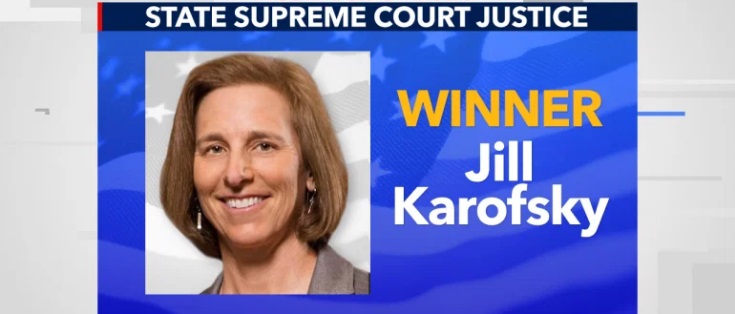A liberal challenger is projected to defeat the conservative incumbent for a seat on the Wisconsin Supreme Court, a key race at the heart of Democratic accusations that Republicans risked voters’ health and safety by going forward with last week’s elections amid the coronavirus pandemic.
Jill Karofsky beat Daniel Kelly, whom then-Gov. Scott Walker (R) appointed to the state’s high court in 2016.
With 62 percent of returns counted, Karofsky led Kelly by more than 67,000 votes, about 6 percentage points.
The contest prompted a rancorous partisan debate over whether to proceed with in-person voting last Tuesday, which Democrats opposed and Republicans supported.
It was also hardfought because of potential implications in the November presidential elections, with a judicial decision about whether to purge the state’s voter rolls hanging in the partisan balance of the court.
Gov. Tony Evers (D), state health officials and local election officials had urged the Republican-led state legislature to postpone the election, but lawmakers refused, citing the risk of confusion and widespread vacancies in thousands of municipal seats on the ballot with terms due to expire in April.
Democrats accused Republicans of trying to take advantage of the likely low turnout resulting from fear of infection and closed polling locations.
The election featured snaking lines in Milwaukee and Green Bay, the result of mass cancellations by poll workers and the closure of polling locations. In Milwaukee, election officials opened just five voting locations, instead of the typical 180.
“Tonight, not just Jill Zarofsky but democracy prevailed over a politically cynical strategy to weaponize the coronavirus pandemic as a tool of voter supression,” said Ben Wikler, chairman of the Wisconsin Democratic Party.
Democrats took Republican lawmakers to court to postpone the election and allow ballots to be mailed after electon day, but the U.S. Supreme Court blocked the effort.
Evers, meanwhile, issued an executive order postponing the election, only to be struck down by the conservative-majority state Supreme Court.
One lower-court ruling did stand, however — that the results would not be issued until Monday, after local election officials had time to receive and count the surge of absentee ballots mailed this year.
Scott L. Fitzgerald, the Republican majority leader in the Wisconsin Senate, told reporters last year that Kelly would have a “better chance” of winning a new term with lower turnout — a statement that fueled accusations from Democrats as to why Republicans wanted to go forward with last Tuesday’s elections.
But heavy mail-in balloting may have upended assumptions about relative advantage; according to statistics issued Monday by the State Elections Commission, nearly 1.1 million Wisconsites cast ballots that way, nearly as many as total turnout in last year’s Supreme Court race — and more than total turnout in the court races in each of the previous two years.
Wikler said GOP maneuvering could ultimately prove to be a miscalculation, especially if a spike in coronavirus infections becomes apparent in the coming days that can be attributed to in-person voting last week.
“In the months to come, most Americans might know someone who is hospitalized or has died of covid 19,” he said. “What seems like a cynically clever gambit to win election before a wave of deaths will feel morally bankrupt to most Americans by the time we arrive at November.”
Republicans entered the election with a 5-2 majority on the state Supreme Court, meaning that a Democratic victory would still leave liberals in the minority until 2025, the next time a conservative justice will face voters.
But an ongoing legal battle over a voter roll purge raised the stakes of this year’s election, with implications for November.
Kelly recused himself, and conservative Justice Brian Hagedorn sided with voting-rights groups to halt the purge.
That left the court deadlocked 3-3, and gave Democrats a shot at stopping the purge, one of their top priorities ahead of the 2020 election.
Democrats warned that further protections for voters are needed before November’s vote.
“Last week, Republicans did everything they could to prevent Wisconsin voters from participating in the election,” said Marc Elias, a D.C.-based Democratic elections lawyer. “The RNC literally went to the US Supreme Court to try to stop the counting of mailed ballots. If they were willing to do this to win a state supreme court seat, imagine what they will do in November.”
Former vice president Joe Biden is also projected to beat Sen. Bernie Sanders (I-Vt.) in the Wisconsin Democratic primary, according to Edison Media Research.
Sanders dropped out of the race the day after the Wisconsin vote, and endorsed Biden earlier today.
